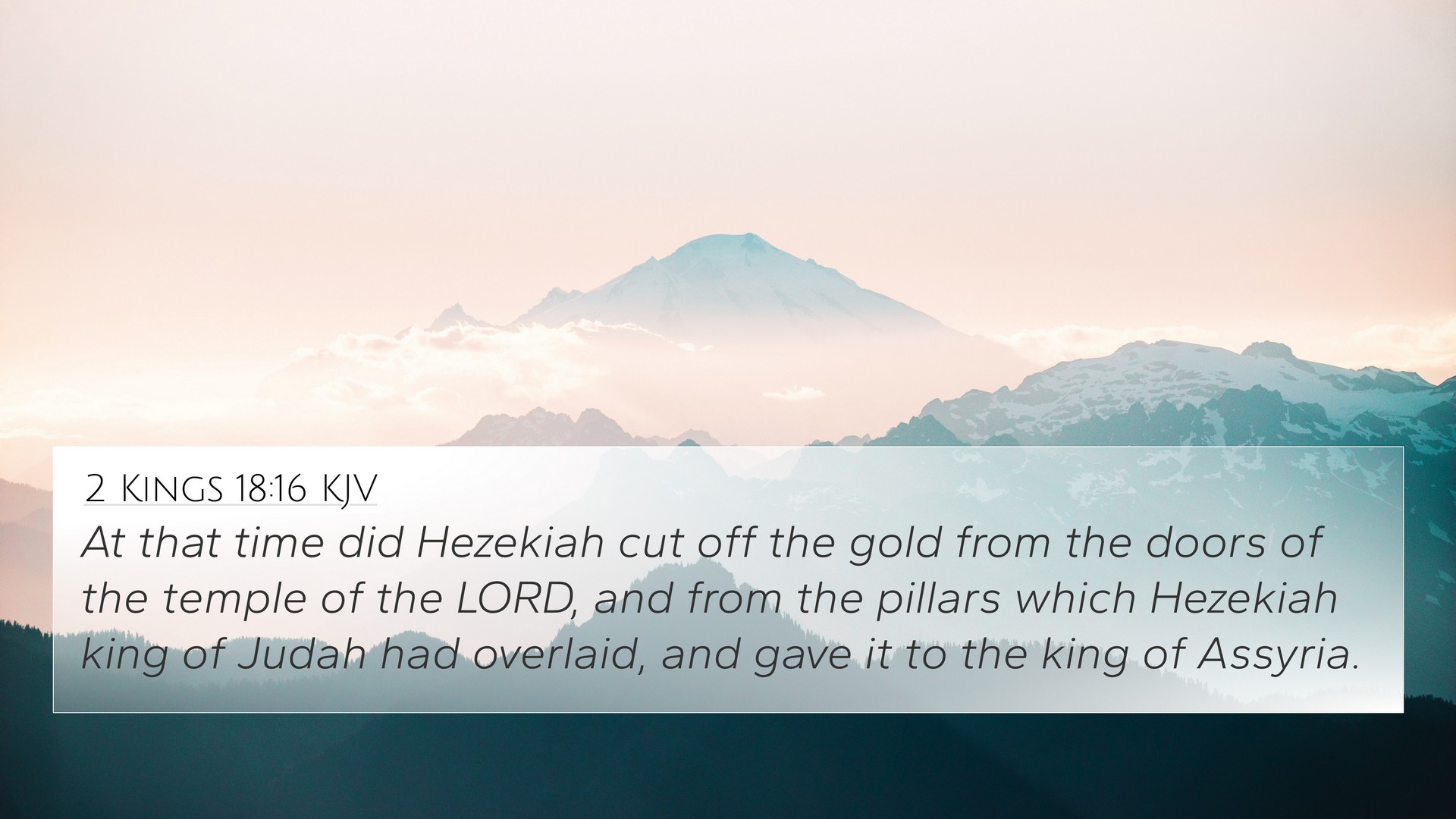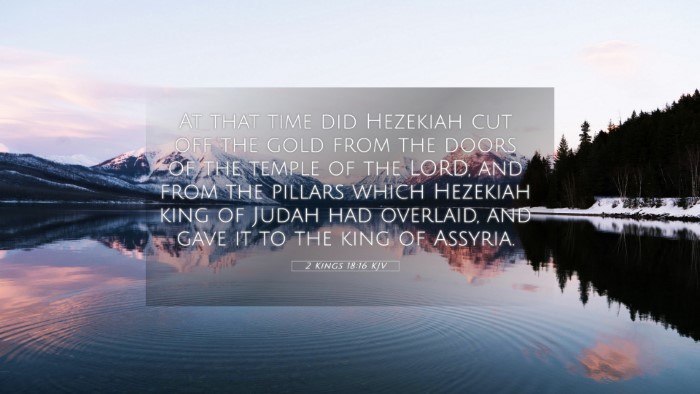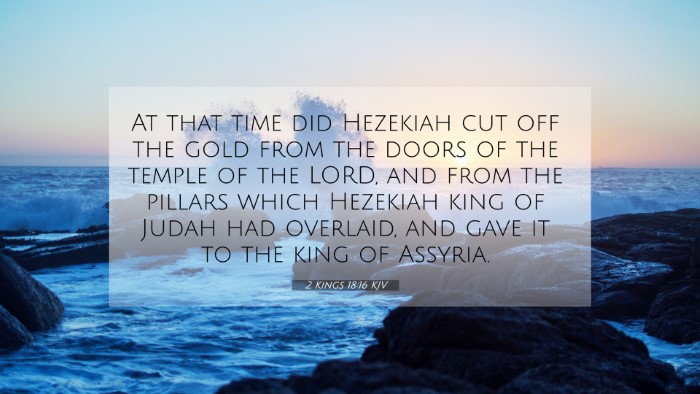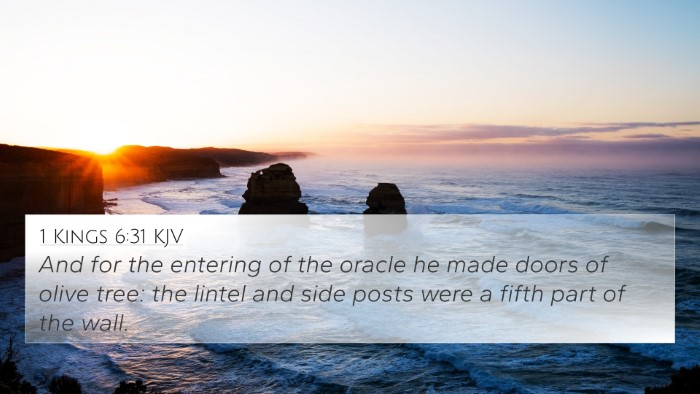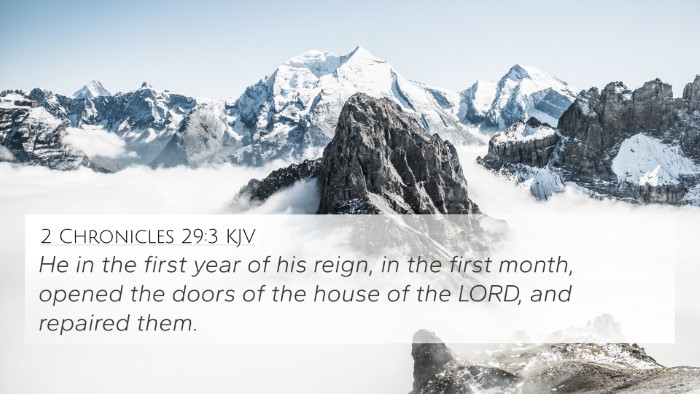Understanding 2 Kings 18:16
2 Kings 18:16 states: "At that time did Hezekiah cut off the gold from the doors of the temple of the Lord, and from the pillars which Hezekiah king of Judah had overlaid, and gave it to the king of Assyria."
Summary of Meaning
This verse captures a crucial moment in the reign of King Hezekiah, illustrating his desperate measures in the face of the Assyrian threat. The act of stripping the gold from the temple is a profound gesture depicting both a religious and political crisis.
Commentary Insights
Matthew Henry's Commentary
Matthew Henry emphasizes the faithlessness of Hezekiah in this moment. Despite living during a time of religious reform, Hezekiah's choice to pay off the Assyrians with the sacred treasures of the temple shows a lack of faith in God’s ability to protect Judah (Henry). He notes that the temple’s treasures were intended for God's glory and should not have been given to a pagan king in appeasement.
Albert Barnes's Commentary
Albert Barnes points out that this act illustrates the desperation of Judah during the Assyrian siege. He suggests that Hezekiah, while a generally godly king, faltered here by failing to trust in the Lord, thereby compromising the sanctity of the temple. Barnes connects this to the overarching theme of reliance on God versus reliance on human solutions (Barnes).
Adam Clarke's Commentary
Adam Clarke elaborates on the implications of Hezekiah's actions, suggesting that removing gold from the temple was not only a sign of weakness but also a potential violation of the covenant law which mandated the sacredness of the temple furnishings. Clarke emphasizes that this decision foretold greater troubles as it represented a temporal solution to a spiritual crisis (Clarke).
Bible Verse Cross-References
The following Bible verses share thematic connections and insights with 2 Kings 18:16:
- 2 Kings 18:14 - Hezekiah seeks help from the king of Assyria.
- Isaiah 36:16-17 - The Assyrians demand surrender, underscoring the siege situations.
- 2 Chronicles 32:3-4 - Hezekiah’s preparations against Assyria also show his response to fear.
- Isaiah 31:1 - Highlighting woe to those who rely on Egypt and horses rather than God.
- Exodus 28:24 - The idea of using sacred items for secular purposes.
- Deuteronomy 12:5-6 - Commanding the exclusive use of dedicated offerings to God.
- Philippians 4:19 - God’s provision highlights true faith against human folly.
Thematic Bible Verse Connections
Understanding the relevance of Hezekiah's choice to strip sacred gold from the temple can be enriched through the following themes:
- Faith and Doubt: Reflects the struggle between faith in God's provision versus the panic of vulnerability.
- Sacred vs. Secular: The division between what belongs to God and what is offered to worldly powers.
- The Consequences of Compromise: How moments of weakness can lead to larger repercussions in a nation’s spiritual health.
- God's Sovereignty: Despite human actions, God's plans overarch and guide the outcomes.
- Divine Protection: Exploring how reliance on God manifests as assurance during trials.
Comparative Bible Verse Analysis
In comparing these verses, we can observe how the decisions made during times of crisis reflect a deeper theological understanding and relationship with God. The inter-Biblical dialogue often signals broader themes of faithfulness and apostasy. For instance, Isaiah 36:20 questions who can deliver from the hand of a king. This underlines Hezekiah's challenge of faith against the might of Assyrian power.
Tools for Bible Cross-Referencing
Utilizing tools such as a Bible concordance or a Bible cross-reference guide can significantly enhance your study. These resources help trace connections and allow for deeper exploration of themes and verses throughout Scripture.
Conclusion
2 Kings 18:16 serves as a pivotal verse that invokes reflection on the interplay between human decisions and divine sovereignty. It serves as a reminder of the importance of fidelity to God's command and the vital necessity of trust in His power over external circumstances. By exploring Bible verse parallels and leveraging cross-referencing tools, believers can foster a richer understanding of scripture and deepen their faith walk.
